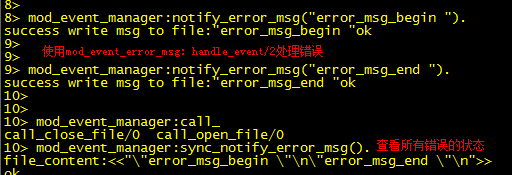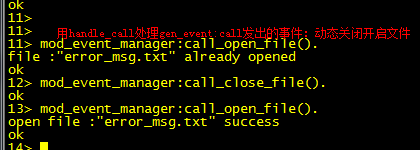Erlang OTP gen_event (1)
演示gen_event的运行过程:
mod_event_manager.erl:事件管理器:
mod_event_error_msg.erl: 错误日志事件:把错误放入对应的txt用。




mod_event_manager.erl:事件管理器:
mod_event_error_msg.erl: 错误日志事件:把错误放入对应的txt用。




%%%------------------------------------------------------------------- %%% @author [email protected] %%% @copyright (C) 2014, <COMPANY> %%% @doc event manager center %%% %%% @end %%%------------------------------------------------------------------- -module(mod_event_manager). -author("[email protected]"). %% API -export([start/0,start_link/0,stop/0,add_handler/2,add_sup_handler/2,del_handler/2]). -export([notify_error_msg/1,sync_notify_error_msg/0,call_open_file/0,call_close_file/0,which_handlers/0]). -define(SERVER, ?MODULE). %% @doc Creates a stand-alone event manager process, %% i.e. an event manager which is not part of a supervision tree and thus has no supervisor. start() -> gen_event:start({local,?SERVER}). %% @doc Creates an event manager process as part of a supervision tree %% @spec start_link() -> {ok, Pid} | {error, {alread_started,Pid}} start_link() -> gen_event:start_link({local,?SERVER}). stop() -> gen_event:stop(?SERVER). %% @doc Adds a new event handler to the event manager %%The event manager will call Module(Handler):init/1 to terminate the event handler. -spec add_handler(Handler,Args) -> ok | {'EXIT',Reason} | term() when Handler::Module | {Module,Id}, Args::term(), Module::atom(), Id::term(), Reason::term(). add_handler(Handler,Args) -> gen_event:add_handler(?SERVER,Handler,Args). %% @doc Adds a new event handler in the same way as add_handler/3 %% but will also supervise the connection between the event handler and the calling process. add_sup_handler(Handler,Args) -> gen_event:add_sup_handler(?SERVER,Handler,Args). %% @doc Deletes an event handler from the event manager:?MODULE %% The event manager will call Module(Handler):terminate/2 to terminate the event handler. -spec del_handler(Handler,Args) -> term() | {'EXIT',Reason} | {error,module_not_found} when Handler::Module | {Module,Id}, Args::term(), Module::atom(), Id::term(), Reason::term(). del_handler(Handler,Args) -> gen_event:delete_handler(?SERVER,Handler,Args). %% @doc 异步写入错误信息 notify_error_msg(Msg) -> gen_event:notify(?SERVER,{update_error_msg,Msg}). %% @doc 得到文件所有错误日志 sync_notify_error_msg() -> gen_event:sync_notify(?SERVER,{file_content}). %% @doc 重新找开储存错误文件:call要指定模块处理 %% 默认timeout 为5000ms call_open_file() -> gen_event:call(?SERVER,mod_event_error_msg,{open}). call_close_file() -> gen_event:call(?SERVER,mod_event_error_msg,{close},10000). %% @doc Returns a list of all event handlers installed in the event manager which_handlers() -> gen_event:which_handlers(?SERVER).
%%%------------------------------------------------------------------- %%% @author [email protected] %%% @copyright (C) 2014, <COMPANY> %%% @doc line event %%% %%% @end %%% Created : 20. 二月 2014 下午2:30 %%%------------------------------------------------------------------- -module(mod_event_error_msg). -author("[email protected]"). -behaviour(gen_event). %% API %% gen_event callbacks -export([init/1, handle_event/2, handle_call/2, handle_info/2, terminate/2, code_change/3]). -define(SERVER, ?MODULE). -record(state, {file_id ,file_name = "error_msg.txt"}). %%%=================================================================== %%% gen_event callbacks %%%=================================================================== %%-------------------------------------------------------------------- %% @private %% @doc %% Whenever a new event handler is added to an event manager, %% this function is called to initialize the event handler. %% %% @end %%-------------------------------------------------------------------- -spec(init(InitArgs :: term()) -> {ok, State :: #state{}} | {ok, State :: #state{}, hibernate} | {error, Reason :: term()}). init(FileName) -> process_flag(trap_exit, true), io:format("mod_event_error_msg: init:"), {ok, Fd} = file:open(FileName, [read, write]), {ok, #state{file_id = Fd,file_name = FileName}}. %%-------------------------------------------------------------------- %% @private %% @doc %% Whenever an event manager receives an event sent using %% gen_event:notify/2 or gen_event:sync_notify/2, this function is %% called for each installed event handler to handle the event. %% %% @end %%-------------------------------------------------------------------- -spec(handle_event(Event :: term(), State :: #state{}) -> {ok, NewState :: #state{}} | {ok, NewState :: #state{}, hibernate} | {swap_handler, Args1 :: term(), NewState :: #state{}, Handler2 :: (atom() | {atom(), Id :: term()}), Args2 :: term()} | remove_handler). handle_event(Event, State) -> NewState = do_handle_event(Event,State), {ok, NewState}. %%-------------------------------------------------------------------- %% @private %% @doc %% Whenever an event manager receives a request sent using %% gen_event:call/3,4, this function is called for the specified %% event handler to handle the request. %% %% @end %%-------------------------------------------------------------------- -spec(handle_call(Request :: term(), State :: #state{}) -> {ok, Reply :: term(), NewState :: #state{}} | {ok, Reply :: term(), NewState :: #state{}, hibernate} | {swap_handler, Reply :: term(), Args1 :: term(), NewState :: #state{}, Handler2 :: (atom() | {atom(), Id :: term()}), Args2 :: term()} | {remove_handler, Reply :: term()}). handle_call(Request, State) -> Reply = ok, NewState = do_handle_call(Request,State), {ok, Reply, NewState}. %%-------------------------------------------------------------------- %% @private %% @doc %% This function is called for each installed event handler when %% an event manager receives any other message than an event or a %% synchronous request (or a system message). %% %% @end %%-------------------------------------------------------------------- -spec(handle_info(Info :: term(), State :: #state{}) -> {ok, NewState :: #state{}} | {ok, NewState :: #state{}, hibernate} | {swap_handler, Args1 :: term(), NewState :: #state{}, Handler2 :: (atom() | {atom(), Id :: term()}), Args2 :: term()} | remove_handler). handle_info(_Info, State) -> {ok, State}. %%-------------------------------------------------------------------- %% @private %% @doc %% Whenever an event handler is deleted from an event manager, this %% function is called. It should be the opposite of Module:init/1 and %% do any necessary cleaning up. %% %% @spec terminate(Reason, State) -> void() %% @end %%-------------------------------------------------------------------- -spec(terminate(Args :: (term() | {stop, Reason :: term()} | stop | remove_handler | {error, {'EXIT', Reason :: term()}} | {error, term()}), State :: term()) -> term()). terminate(_Arg, _State) -> io:format("mod_event_line terminate:~p:::State:~p~n",[_Arg,_State]), ok. %%-------------------------------------------------------------------- %% @private %% @doc %% Convert process state when code is changed %% %% @end %%-------------------------------------------------------------------- -spec(code_change(OldVsn :: term() | {down, term()}, State :: #state{}, Extra :: term()) -> {ok, NewState :: #state{}}). code_change(_OldVsn, State, _Extra) -> {ok, State}. %%%=================================================================== %%% Internal functions %%%=================================================================== do_handle_event({update_error_msg,Msg},#state{file_id=Fd} = State) -> io:format(Fd,"~p~n",[Msg]), io:format("success write msg to file:~p",[Msg]), State; do_handle_event({file_content},#state{file_id=_Fd,file_name = FileName} = State) -> case file:read_file(FileName) of {ok,ErrorMsg} -> io:format("file_content:~p~n",[ErrorMsg]); {error,Reason} -> io:format("file consult error:~p~n",[Reason]) end, State; do_handle_event(Msg,#state{file_id=_Fd} = State) -> io:format("mod_event_error_msg:cannot handler_event this msg :~p",[Msg]), State. do_handle_call({open},State = #state{file_id=0,file_name = FileName}) -> {ok, NewFd} = file:open(FileName, [append,write]), io:format("open file :~p success~n",[FileName]), State#state{file_id=NewFd}; do_handle_call({open},State = #state{file_name = FileName}) -> io:format("file :~p already opened~n",[FileName]), State; do_handle_call({close},State = #state{file_id = Fd}) -> file:close(Fd), State#state{file_id = 0}; do_handle_call(Msg,State) -> io:format("mod_event_error_msg:cannot handler_call this msg :~p",[Msg]), State.